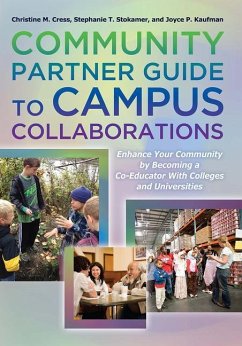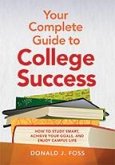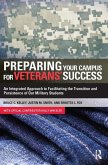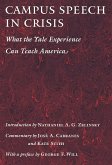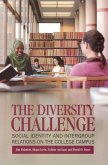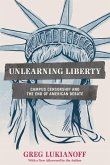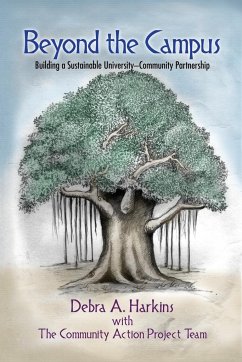Christine M Cress, Stephanie T Stokamer, Joyce P Kaufman
Community Partner Guide to Campus Collaborations
Enhance Your Community by Becoming a Co-Educator with Colleges and Universities
Christine M Cress, Stephanie T Stokamer, Joyce P Kaufman
Community Partner Guide to Campus Collaborations
Enhance Your Community by Becoming a Co-Educator with Colleges and Universities
- Broschiertes Buch
- Merkliste
- Auf die Merkliste
- Bewerten Bewerten
- Teilen
- Produkt teilen
- Produkterinnerung
- Produkterinnerung
Recognizing both the possibilities and the pitfalls of community-campus collaborations, this sudy demystifies the often confusing terminology of education, explains how to locate the right individuals on campus, and addresses issues of mission, expectations for roles, tasks, training, supervision, and evaluation that can be fraught with miscommunication and misunderstanding.
Andere Kunden interessierten sich auch für
![Your Complete Guide to College Success: How to Study Smart, Achieve Your Goals, and Enjoy Campus Life Your Complete Guide to College Success: How to Study Smart, Achieve Your Goals, and Enjoy Campus Life]() Donald J. FossYour Complete Guide to College Success: How to Study Smart, Achieve Your Goals, and Enjoy Campus Life43,99 €
Donald J. FossYour Complete Guide to College Success: How to Study Smart, Achieve Your Goals, and Enjoy Campus Life43,99 €![Dispatches From the Campus War Against Israel and Jews Dispatches From the Campus War Against Israel and Jews]() Richard L. CravattsDispatches From the Campus War Against Israel and Jews18,99 €
Richard L. CravattsDispatches From the Campus War Against Israel and Jews18,99 €![Preparing Your Campus for Veterans' Success Preparing Your Campus for Veterans' Success]() Bruce KelleyPreparing Your Campus for Veterans' Success52,99 €
Bruce KelleyPreparing Your Campus for Veterans' Success52,99 €![Campus Speech in Crisis: What the Yale Experience Can Teach America Campus Speech in Crisis: What the Yale Experience Can Teach America]() Campus Speech in Crisis: What the Yale Experience Can Teach America6,99 €
Campus Speech in Crisis: What the Yale Experience Can Teach America6,99 €![The Diversity Challenge: Social Identity and Intergroup Relations on the College Campus The Diversity Challenge: Social Identity and Intergroup Relations on the College Campus]() James SidaniusThe Diversity Challenge: Social Identity and Intergroup Relations on the College Campus41,99 €
James SidaniusThe Diversity Challenge: Social Identity and Intergroup Relations on the College Campus41,99 €![Unlearning Liberty: Campus Censorship and the End of American Debate Unlearning Liberty: Campus Censorship and the End of American Debate]() Greg LukianoffUnlearning Liberty: Campus Censorship and the End of American Debate15,99 €
Greg LukianoffUnlearning Liberty: Campus Censorship and the End of American Debate15,99 €![Beyond the Campus Beyond the Campus]() Debra A. HarkinsBeyond the Campus62,99 €
Debra A. HarkinsBeyond the Campus62,99 €-
-
-
Recognizing both the possibilities and the pitfalls of community-campus collaborations, this sudy demystifies the often confusing terminology of education, explains how to locate the right individuals on campus, and addresses issues of mission, expectations for roles, tasks, training, supervision, and evaluation that can be fraught with miscommunication and misunderstanding.
Hinweis: Dieser Artikel kann nur an eine deutsche Lieferadresse ausgeliefert werden.
Hinweis: Dieser Artikel kann nur an eine deutsche Lieferadresse ausgeliefert werden.
Produktdetails
- Produktdetails
- Verlag: Taylor & Francis
- Seitenzahl: 136
- Erscheinungstermin: 13. April 2015
- Englisch
- Abmessung: 251mm x 175mm x 10mm
- Gewicht: 227g
- ISBN-13: 9781620361368
- ISBN-10: 1620361361
- Artikelnr.: 41620298
- Herstellerkennzeichnung
- Libri GmbH
- Europaallee 1
- 36244 Bad Hersfeld
- gpsr@libri.de
- Verlag: Taylor & Francis
- Seitenzahl: 136
- Erscheinungstermin: 13. April 2015
- Englisch
- Abmessung: 251mm x 175mm x 10mm
- Gewicht: 227g
- ISBN-13: 9781620361368
- ISBN-10: 1620361361
- Artikelnr.: 41620298
- Herstellerkennzeichnung
- Libri GmbH
- Europaallee 1
- 36244 Bad Hersfeld
- gpsr@libri.de
Christine M. Cress is Professor of Educational Leadership, Higher Education Policy, and Community Engagement at Portland State University. She received her Ph.D. from UCLA and was a Fulbright Senior Scholar at Middle East Technical University in Ankara, Turkey. She has conducted professional trainings on curricular integration and the scholarship of service-learning at scores of colleges in North America, Europe, Japan, India, and Nepal. Earlier in her career, she was an academic and career adviser at Western Washington University, Whatcom Community College, and Northwest Indian College. For the last twenty years at PSU, she has directed Master and Doctoral degrees and a fully on-line Graduate Certificate in Service-Learning including facilitation of short-term international service-learning and COIL/Virtual Exchange classes in India, Japan, Morocco, and Turkey. Her cultural privilege is primarily northern European American with Cherokee (non-tribal affiliation) and Sene-Gambian heritage. She is a first-generation college student, adoptee and adoptive parent, and member of a multi-racial lesbian family. These myriad social positions influence her scholarship which addresses intersectionality, systemic oppression, and equity-centered education and community engagement. Stephanie T. Stokamer is Associate Professor of Civic Engagement and Director of Applied & Experiential Learning at Pacific University, where she leads the McCall Center for Civic Engagement. With a doctorate in educational leadership from Portland State University, she has facilitated and administered undergraduate and graduate community-based learning programs since 2005. Her scholarship focuses on service-learning and civic engagement, particularly with respect to pedagogical practices and faculty development. She is an AmeriCorps*VISTA alum and former National Service Fellow for the Corporation for National and Community Service. Stephanie comes to this work as a committed ally and accomplice for social justice, with identities rooted in her experience as a cis-gender, heterosexual woman of Anglo heritage. Joyce P. Kaufman Professor of Political Science and Director of the Center for Engagement with Communities at Whittier College. She is the author of A Concise History of U.S. Foreign Policy, 2nd ed. (Rowman & Littlefield Publishers, Inc., 2010) and NATO and the Former Yugoslavia: Crisis, Conflict and the Atlantic Alliance (Rowman & Littlefield Publishers, Inc., 2002), and co-editor of The Future of Transatlantic Relations: Perceptions, Policy and Practice (with Andrew M. Dorman) (Stanford Security Studies, 2011). She is also the author of numerous articles and papers on U.S. foreign and security policy. With Kristen Williams, she is co-author of Women and War: Gender Identity and Activism in Times of Conflict (Kumarian Press, 2010) and Women, the State, and War: A Comparative Perspective on Citizenship and Nationalism (Lexington Books, 2007).
1. INTRODUCTION Considerations for Connecting With Colleges Clarifying
Confusing Terminology Creating Enriching Collaborations for Community
Enhancement Conclusion 2. EXPLORE POSSIBILITIES Calling on Your Networks
for Co-Education Connecting With Campus Offices Conduits of Connection.
AmeriCorps College Websites Checking in With Clubs Convening With Other
Campus Communities Collaborating With Faculty Courses and Community-Based
Research Conclusion 3. ESTABLISH RELATIONSHIPS Characteristics and Contexts
of Enriching Collaborations Crossing Cultural Boundaries Common Agreements
Conclusion 4. ENGAGE FACULTY Comprehending Faculty Work Life Communicate
Co-Educational Goals Create Objectives and Expectations Co-Construct
Content, Assignments, Activities, and Timelines Compare Experiences for
Improvement Conclusion 5. EMPOWER STUDENTS Cultural Preparation
Constructive Controversy Career and Life Coaching Condensed Connections.
Empowering Students During Short-Term Service Conclusion 6. EVALUATE IMPACT
Create Assessment Methods for Impact and Iteration Collect and Analyze
Meaningful Data for Learning, Enhancement, and Scholarship Civic
Improvement Through Dissemination and Celebration of Accomplishments
Conclusion 7. SUMMARY AND CONCLUSION Collaborations for Community
Enrichment Collaborations for Academic Excellence and Engaged Scholarship
Continuums of Co-Education and Conclusions REFERENCES APPENDIX
Organizations Handbooks and Guides Literature INDEX
Confusing Terminology Creating Enriching Collaborations for Community
Enhancement Conclusion 2. EXPLORE POSSIBILITIES Calling on Your Networks
for Co-Education Connecting With Campus Offices Conduits of Connection.
AmeriCorps College Websites Checking in With Clubs Convening With Other
Campus Communities Collaborating With Faculty Courses and Community-Based
Research Conclusion 3. ESTABLISH RELATIONSHIPS Characteristics and Contexts
of Enriching Collaborations Crossing Cultural Boundaries Common Agreements
Conclusion 4. ENGAGE FACULTY Comprehending Faculty Work Life Communicate
Co-Educational Goals Create Objectives and Expectations Co-Construct
Content, Assignments, Activities, and Timelines Compare Experiences for
Improvement Conclusion 5. EMPOWER STUDENTS Cultural Preparation
Constructive Controversy Career and Life Coaching Condensed Connections.
Empowering Students During Short-Term Service Conclusion 6. EVALUATE IMPACT
Create Assessment Methods for Impact and Iteration Collect and Analyze
Meaningful Data for Learning, Enhancement, and Scholarship Civic
Improvement Through Dissemination and Celebration of Accomplishments
Conclusion 7. SUMMARY AND CONCLUSION Collaborations for Community
Enrichment Collaborations for Academic Excellence and Engaged Scholarship
Continuums of Co-Education and Conclusions REFERENCES APPENDIX
Organizations Handbooks and Guides Literature INDEX
1. INTRODUCTION Considerations for Connecting With Colleges Clarifying
Confusing Terminology Creating Enriching Collaborations for Community
Enhancement Conclusion 2. EXPLORE POSSIBILITIES Calling on Your Networks
for Co-Education Connecting With Campus Offices Conduits of Connection.
AmeriCorps College Websites Checking in With Clubs Convening With Other
Campus Communities Collaborating With Faculty Courses and Community-Based
Research Conclusion 3. ESTABLISH RELATIONSHIPS Characteristics and Contexts
of Enriching Collaborations Crossing Cultural Boundaries Common Agreements
Conclusion 4. ENGAGE FACULTY Comprehending Faculty Work Life Communicate
Co-Educational Goals Create Objectives and Expectations Co-Construct
Content, Assignments, Activities, and Timelines Compare Experiences for
Improvement Conclusion 5. EMPOWER STUDENTS Cultural Preparation
Constructive Controversy Career and Life Coaching Condensed Connections.
Empowering Students During Short-Term Service Conclusion 6. EVALUATE IMPACT
Create Assessment Methods for Impact and Iteration Collect and Analyze
Meaningful Data for Learning, Enhancement, and Scholarship Civic
Improvement Through Dissemination and Celebration of Accomplishments
Conclusion 7. SUMMARY AND CONCLUSION Collaborations for Community
Enrichment Collaborations for Academic Excellence and Engaged Scholarship
Continuums of Co-Education and Conclusions REFERENCES APPENDIX
Organizations Handbooks and Guides Literature INDEX
Confusing Terminology Creating Enriching Collaborations for Community
Enhancement Conclusion 2. EXPLORE POSSIBILITIES Calling on Your Networks
for Co-Education Connecting With Campus Offices Conduits of Connection.
AmeriCorps College Websites Checking in With Clubs Convening With Other
Campus Communities Collaborating With Faculty Courses and Community-Based
Research Conclusion 3. ESTABLISH RELATIONSHIPS Characteristics and Contexts
of Enriching Collaborations Crossing Cultural Boundaries Common Agreements
Conclusion 4. ENGAGE FACULTY Comprehending Faculty Work Life Communicate
Co-Educational Goals Create Objectives and Expectations Co-Construct
Content, Assignments, Activities, and Timelines Compare Experiences for
Improvement Conclusion 5. EMPOWER STUDENTS Cultural Preparation
Constructive Controversy Career and Life Coaching Condensed Connections.
Empowering Students During Short-Term Service Conclusion 6. EVALUATE IMPACT
Create Assessment Methods for Impact and Iteration Collect and Analyze
Meaningful Data for Learning, Enhancement, and Scholarship Civic
Improvement Through Dissemination and Celebration of Accomplishments
Conclusion 7. SUMMARY AND CONCLUSION Collaborations for Community
Enrichment Collaborations for Academic Excellence and Engaged Scholarship
Continuums of Co-Education and Conclusions REFERENCES APPENDIX
Organizations Handbooks and Guides Literature INDEX

